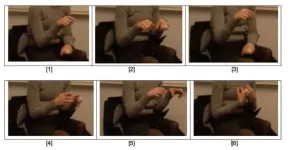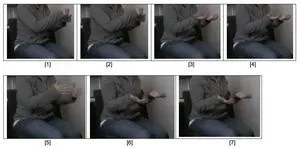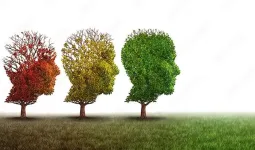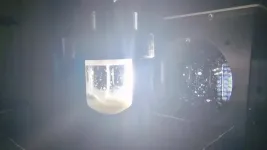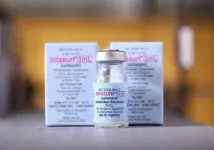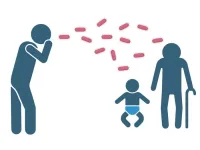(Press-News.org) When we talk, we often use our hands in addition to words. Gesturing is a phenomenon that has been observed across languages and cultures. Some cultures are typically thought to use more gestures than others.
To find out if the deeply rooted stereotype of Italians gesturing more than other cultures is true, researchers in Sweden have examined the differences in gesture rate and function between Italians and Swedes who were telling a story to a friend.
“We show that Italians do gesture more than Swedes, which was expected,” said Dr Maria Graziano, the first author of the Frontiers in Communication article and associate professor at Lund University Humanities Lab. “More interestingly, we demonstrate that people from different cultures use gestures differently, due to varying rhetorical styles and different ways of constructing a story.”
Talking hands
Together with Prof Marianne Gullberg, a psycholinguist at the same lab, Graziano had 12 Italian and 12 Swedish participants retell the story of a 90-second clip from the cartoon ‘Pingu’ to a friend who had not watched the cartoon. Researchers who study gestures commonly use cartoons because the characters often do not speak, and viewers can retell the story using their own words without input from the source.
As expected, the findings showed that Italian speakers did gesture more frequently overall. Per 100 words, Italians used an average of 22 gestures, whereas Swedes used just 11.
In addition to gesture frequency, the researchers observed who used which gestures to what end. “When we tell stories we combine several kinds of information: we introduce characters and events, describe actions, and explain why. We check that our listener understands what we’re saying. And if we are telling a story based on cartoon, we refer to the act of watching, too,” Graziano explained. “When we describe an action, it is more likely that we produce a gesture that represents that action; while if we talk about characters or settings, it is more likely that we make a gesture that ‘offers’ this information to the listener.”
Italians tended to use more pragmatic gestures – those that mainly comment on the story and present new parts of it to the listener. Swedes, instead, tended to use more representational gestures, which mostly represent the events and actions of the story. “This indicates that Italians and Swedes adopt different rhetorical styles in telling a story and that they conceptualize it in a different way,” Graziano pointed out.
How cultures think about stories
Currently, it is unclear why Swedes and Italians may conceptualize narratives differently. A possible explanation is that some cultures attribute different values to narration than others, which could lead to varying ways of organizing speech content and impact gesturing. This, however, needs to be confirmed by further studies, the researchers pointed out.
Future studies should also include more participants, including participant pairs who do not know each other, as familiarity may impact rhetorical choices made by speakers. Taking an approach that looks closely at both the content of the speech and the function of gestures can also help understand why cultures differ in narrative production, the researchers said.
“I hope that this study helps people consider gestures from a different perspective and go beyond stereotypical and folkloristic views. Gestures are produced in all languages and cultures, and they are not a mere embellishment of speech; they are closely related to what we are saying and how we want to say it,” Graziano concluded.
END
Italians’ and Swedes’ gestures vary when they tell stories, which may show cultures think differently about narratives
Researchers found that Swedes and Italians use different gestures, which may reveal culturally different ways of conceptualizing narratives when telling a story
2024-03-26
ELSE PRESS RELEASES FROM THIS DATE:
New treatment target identified for Alzheimer's disease
2024-03-26
Researchers at the University of Leeds and Lancaster University in the UK have identified a new potential target for the treatment of Alzheimer’s disease – PDE4B.
Alzheimer's disease is the leading cause of dementia and disability in old age. As the number of people diagnosed with Alzheimer’s disease is on the increase, new treatments are urgently needed to improve the quality of life for people living with the disease.
PDE4B is an enzyme inside cells that breaks down a molecule known as cyclic AMP, which regulates a range of cellular processes. Based on an Australian study that identified the ...
Discovery of amino acid unveils how light makes plants open
2024-03-26
Scientists from Nagoya University have discovered a novel regulatory mechanism that controls the opening of stomata in plants, which is crucial for harnessing solar energy through photosynthesis. The team uncovered the role of phosphorylation at the 881st threonine residue (Thr881) of the plasma membrane proton pump in response to red and blue light in this process. This research opens up possibilities for manipulating plant physiology in specific ways, benefiting agriculture and the environment. The researchers reported their findings in Nature Communications.
“This phosphorylation event, ...
Crackdown on illicit drugs detects rise in ‘designer’ drug substitutes
2024-03-26
As authorities crack down on illicit drugs, University of South Australia experts have issued an alert on the use of the synthetic stimulant pentylone, as new research finds a 75% increase in detections across Australia.
In a new study as part of the Australian Criminal Intelligence Commission’s National Wastewater Drug Monitoring Program, researchers identified 20 different novel psychoactive substances (NPS) in wastewater treatment plants across Australia (between Feb 22-23) with pentylone detected at every collection site. Other NPS, eutylone and phenibut were also commonly detected.
Pentylone, (street name ‘bath salts’), ...
Treatment for blindness-causing retinal detachment using viscous seaweed
2024-03-26
It’s taboo to consume seaweed soup before exams in Korea since it can lead to failing the exam. The belief is rooted in the idea that the slippery nature of seaweed may cause people to slip and falter during the test. The slick surface of seaweeds such as seaweed and kelp is attributed to alginate, a mucilaginous substance. Notably, an intriguing study exploring the use of alginate for the treatment of retinal detachment has been recently published.
A collaborative effort between Professor Hyung Joon Cha from the Department of Chemical Engineering and the School of Convergence Science and Technology and Dr. Geunho Choi from ...
More needs to be done for depressed stroke survivors as incidence climbs
2024-03-26
Researchers say more needs to be done for depressed stroke survivors as new findings show 60% of stroke survivors would experience depression within 18 years, a much higher estimation than previous studies.
This compares to 22% of the general population experiencing depression in the same time frame.
The King’s College London study, published today in The Lancet Regional Health – Europe, also found 90% of cases of depression occurred within five years of surviving a stroke, indicating a key time for healthcare intervention.
The findings, funded by the National Institute for Health and Care Research, looks at incidence of mild ...
Research lights up process for turning CO2 into sustainable fuel
2024-03-26
Researchers have successfully transformed CO2 into methanol by shining sunlight on single atoms of copper deposited on a light-activated material, a discovery that paves the way for creating new green fuels.
An international team of researchers from the University of Nottingham's School of Chemistry, University of Birmingham, University of Queensland and University of Ulm have designed a material, made up of copper anchored on nanocrystalline carbon nitride. The copper atoms are nested ...
Essays on democracy draw attention to critical threats, explore safeguards ahead of Jan. 6
2024-03-25
Following the events of Jan. 6, 2021 — when a violent mob stormed the U.S. Capitol building in an effort to interrupt the certification process of the 2020 presidential election — experts began to question how to protect the next presidential election from a similar threat. To that end, University of Notre Dame political scientists have partnered with preeminent scholars of democracy from across the country to produce a set of recommendations to strengthen and safeguard democracy in America.
The University’s Rooney Center for the Study of American Democracy established the January 6th, ...
New surfactant could improve lung treatments for premature babies
2024-03-25
Scientists have developed a new lung surfactant that is produced synthetically rather than relying on the use of animal tissues. With further development, the formulation could provide a cheaper and more readily available alternative to Infasurf, a medication used to prevent and treat respiratory distress in premature babies.
Surfactants are substances that decrease surface tension where liquids interface with other liquids, gases or solids. In addition to their use in medicines, they are found in a wide range of products including detergents, cosmetics, motor oils and adhesives.
Suzanne Farver Lukjan, a lecturer in chemistry ...
Researchers uncover key biomolecule involved in whooping cough infection
2024-03-25
Researchers have identified a new complex-carbohydrate biomolecule, or glycan, that plays a key role in the nasal colonization of the Bordetella bacteria responsible for whooping cough. The discovery could make it possible to create a new drug or vaccine that interferes with the glycan to greatly reduce or even stop ongoing Bordetella transmission.
Bordetella pertussis is the cause of the respiratory infection pertussis, which is widely known as whooping cough. Today’s pertussis vaccines keep people from getting severely sick, but they don’t eliminate the bacteria because it excels at colonizing, ...
Study links long-term consumption of reused deep-fried oil with increased neurodegeneration
2024-03-25
A new study found higher levels of neurodegeneration in rats that consumed reused deep fried cooking oils and their offspring compared to rats on a normal diet. Deep frying, which involves completely submerging food in hot oil, is a common method of food preparation around the world.
Results from the study also suggest that the increased neurodegeneration is tied to the oil’s effects on the bidirectional communication network between the liver, gut and brain. The liver–gut–brain axis plays a crucial role in regulating various physiological functions, and its dysregulation has been ...
LAST 30 PRESS RELEASES:
ASU researchers to lead AAAS panel on water insecurity in the United States
ASU professor Anne Stone to present at AAAS Conference in Phoenix on ancient origins of modern disease
Proposals for exploring viruses and skin as the next experimental quantum frontiers share US$30,000 science award
ASU researchers showcase scalable tech solutions for older adults living alone with cognitive decline at AAAS 2026
Scientists identify smooth regional trends in fruit fly survival strategies
Antipathy toward snakes? Your parents likely talked you into that at an early age
Sylvester Cancer Tip Sheet for Feb. 2026
Online exposure to medical misinformation concentrated among older adults
Telehealth improves access to genetic services for adult survivors of childhood cancers
Outdated mortality benchmarks risk missing early signs of famine and delay recognizing mass starvation
Newly discovered bacterium converts carbon dioxide into chemicals using electricity
Flipping and reversing mini-proteins could improve disease treatment
Scientists reveal major hidden source of atmospheric nitrogen pollution in fragile lake basin
Biochar emerges as a powerful tool for soil carbon neutrality and climate mitigation
Tiny cell messengers show big promise for safer protein and gene delivery
AMS releases statement regarding the decision to rescind EPA’s 2009 Endangerment Finding
Parents’ alcohol and drug use influences their children’s consumption, research shows
Modular assembly of chiral nitrogen-bridged rings achieved by palladium-catalyzed diastereoselective and enantioselective cascade cyclization reactions
Promoting civic engagement
AMS Science Preview: Hurricane slowdown, school snow days
Deforestation in the Amazon raises the surface temperature by 3 °C during the dry season
Model more accurately maps the impact of frost on corn crops
How did humans develop sharp vision? Lab-grown retinas show likely answer
Sour grapes? Taste, experience of sour foods depends on individual consumer
At AAAS, professor Krystal Tsosie argues the future of science must be Indigenous-led
From the lab to the living room: Decoding Parkinson’s patients movements in the real world
Research advances in porous materials, as highlighted in the 2025 Nobel Prize in Chemistry
Sally C. Morton, executive vice president of ASU Knowledge Enterprise, presents a bold and practical framework for moving research from discovery to real-world impact
Biochemical parameters in patients with diabetic nephropathy versus individuals with diabetes alone, non-diabetic nephropathy, and healthy controls
Muscular strength and mortality in women ages 63 to 99
[Press-News.org] Italians’ and Swedes’ gestures vary when they tell stories, which may show cultures think differently about narrativesResearchers found that Swedes and Italians use different gestures, which may reveal culturally different ways of conceptualizing narratives when telling a story
